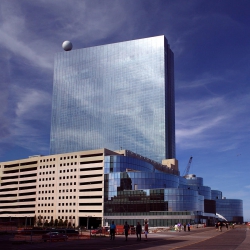Revel Casino appears to be headed towards a third round of bidding after a bankruptcy judge declined to extend the purchase deadline for Florida developer Glenn Straub. Despite US Bankruptcy Judge Gloria Burns’ refusal to extend the deadline, she did not rule on Revel AC’s request to terminate Glenn Straub’s $94.5 million purchase of the troubled Revel Casino.
Revel AC, the company which owns the bankrupt and closed Revel Casino at present, wants to terminate the sale of the Revel Casino and keep the $10 million deposit paid by Glenn Straub and Polo North Golf Course of Florida. Straub has fought that legal move, saying he was not given the necessary time to complete the purchase, due to lawsuits from Revel’s tenants: the restaurants, bars, and nightclubs which have contracts there.
Glenn Straub Lectures Cunningham
Glenn Straub could be heard lecturing Revel lawyer John Cunningham on the difficulties put in place by Atlantic City locals. Straub also could be heard telling Cunningham that his money might be better spent in South Florida.
ABC News reported Straub as saying, “Are we investing in Miami and spending $2 billion there? Why do we want to deal with $15 million in legal fees, power being shut off? What you guys are doing is affecting a lot of people’s lives.”
Moskovitz Says They’re Ready to Close
Stuart Moskovitz, a lawyer for Glenn Straub, indicated his side is ready to close the deal, despite the difficulties. He said lawsuits involving their potential tenants were casting doubt on the process. Moskovitz said, “We were anxious to move forward, and we still are. We are anxious to close as quickly as possible, but we need to know what we’re closing on.”
Judge Burns indicated she would make a decision on whether to terminate the purchase next Tuesday. She has indicated already that, if the deal is voided, a third auction would be opened up to anyone.
The list of bidders could include Glenn Straub, who would be free as anyone to submit a new bid. Moskovitz indicate any new process likely would involve much lower offers for the casino. When asked if Straub would participate in a third bid process, the lawyer said, “If we can buy this for $40 million instead of $95.4 million, why not?”
Revel Wants a Third Buyer
John Cunningham, for his part, said Revel AC would like to find a third interested buyer, apart from Polo North and Brookfield. Cunningham said, “We’re ready to move on from Polo North. We’re ready to find a new buyer. We have zero confidence in Polo North’s ability to close.”
The process between Straub and Revel AC has been contentious from the beginning, when Straub sued in protest at the way Revel Casino’s owners conducted the bankruptcy auction.
Moskovitz on the Revel Deposit
Meanwhile, Stuart Moskovitz heaped scorn on the idea that Revel’s owners would pocket the deposit, instead of trying to complete a fair sale of the assets. Mr. Moskovitz said, “If Revel terminates this contract, it will cost them tens of millions of dollars. They will never get a bid at these numbers. From Day One, Revel was a disaster, in every way imaginable.”
While the lawyer’s words might have been motivated by his client’s interests, the phrase “disaster in every imaginable way” would be hard to dispute. Revel Casino was built for $2.4 billion. Before the casino opened, Morgan Stanley walked away from its $900 million investment in the casino, because it did not believe in the project. Revel Casino was conceived as a Las Vegas style resort, but the plan was developed in a time of economic prosperity and in a state in which working class values trumped the glitz and glamor of Las Vegas. During the Global Recession, such ideas were bound to fail.
Revel Casino’s Opening
Despite those concerns, Revel AC opened the casino in April of 2012 to much acclaim. No other building on the Boardwalk is nearly as impressive as the architectural wonder of Revel Casino, which one engineer said was the most beautiful building on America’s east coast. The casino had problems from the beginning, though. Within one 15 month period, it entered bankruptcy twice.
Along the way, the casino’s valued has plummeted several times to new lows. In September 2014, the casino closed. Glenn Straub, a Florida real estate developer, made a $90 million bid on the casino resort during the early bankruptcy process in October 2014. It appeared for several weeks that Straub would win the bidding unopposed, and would turn the casino in a rail link and school for “geniuses”.
The Bidding Process Retold
At the last moment, Brookfield Asset Management out of Toronto, Canada entered the bidding. In the bidding process, Brookfield won with a $110 million bid, beating out Straub’s $94.5 million bid. Straub claimed inconsistencies in the auction process and filed a lawsuit to have Brookfield’s bid thrown out.
Meanwhile, Brookfield began having problems of its own. When it could not renegotiate a $3 million per month energy bill with ACR Energy Partners, the supplier of electricity to Revel Casino, Brookfield announced it would pull out of the purchase process. Revel AC pocketed Brookfield’s $11 million deposit and Glenn Straub became the new winner of the bidding.
Straub immediately sued to have the bidding thrown out, so he could purchase the casino for the original $90 million price–minus the $3 million deposit he originally pocketed as the stalking horse bidder when Brookfield won the auction.

